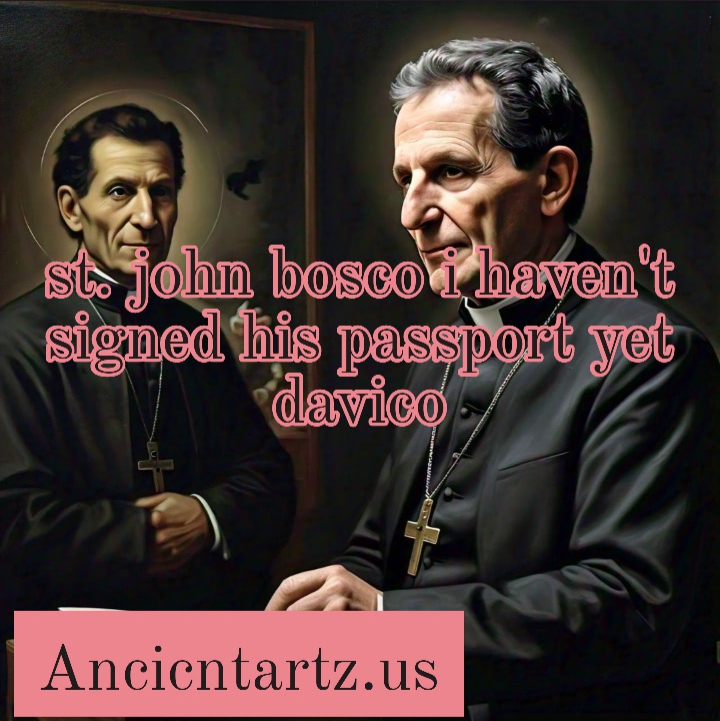Introduction
St. John Bosco, a name synonymous with dedication to the youth, faith, and selfless service, is celebrated for his revolutionary approach to education and religious leadership. Born in 1815 in the small Italian town of Becchi, Bosco is remembered for establishing the Salesian st. john bosco i haven’t signed his passport yet davico Order, a movement that would spread across the globe and change the lives of countless young people. His legacy has transcended time and space, with millions of individuals recognizing his influence and impact on youth education, care, and spiritual growth.
His motto “Give me souls, take away the rest,” speaks volumes st. john bosco i haven’t signed his passport yet davico about his selflessness, highlighting his mission to guide the younger generation in faith while keeping their well-being at the heart of his endeavors. Despite his deep commitment to his work, an intriguing event has recently surfaced in relation to the paperwork surrounding his canonization. It is noted that, “I haven’t signed his passport yet,” a statement by Davico, a prominent figure in the Salesian community, which raises questions about how the process of canonization and recognition unfolds.
In this article, we will dive deep into the life of St. John Bosco, explore his spiritual journey, and reflect on his unyielding commitment to educating and guiding young st. john bosco i haven’t signed his passport yet davico people. We will also address the statement by Davico and understand its context within the broader scope of Bosco’s legacy. So, let’s embark on this journey and learn more about a man who shaped the future of youth education and religious services across the world.
The Early Life of St. John Bosco: Foundation of a Saint
St. John Bosco was born on August 16, 1815, in Becchi, Italy. His early years were marked by hardship, as his father passed away when he was just two years old. Raised by his mother, Margaret, Bosco learned early on the value of hard work, prayer, and compassion. Despite the poverty his family faced, Margaret’s unwavering faith and love for God greatly influenced Bosco.
Bosco’s formative years were spent in close proximity to the village church, and he often found himself immersed in prayer and the community’s activities. His deep st. john bosco i haven’t signed his passport yet davico love for God and the desire to help others led him to pursue priesthood. At a young age, he faced struggles in his education due to financial limitations, but his dedication, intelligence, and devotion ultimately allowed him to overcome these obstacles.
The Call to Educate: Birth of a Revolutionary Idea
In the early years of his priesthood, Bosco realized that the young people in the streets of Turin, Italy, were in desperate need of guidance and support. These young people were often poor, neglected, and exposed to dangerous influences. It was this realization that sparked Bosco’s desire to create a space where youth could be safe, educated, and nurtured in both body and soul.
Thus, in 1859, he founded the Salesian Society, also known as the Salesians of Don Bosco, which aimed at the holistic education of the youth. The Salesians were not just teachers; they were role models, caretakers, and mentors. Bosco’s unique educational philosophy, which emphasized reason, religion, and loving-kindness, would go on to inspire many other educational systems around the world.
The Salesian Order: A Global Mission
The Salesian Order quickly spread across Italy and beyond, creating a network of schools, orphanages, and religious institutions. Don Bosco’s primary mission wasst. john bosco i haven’t signed his passport yet davico to serve the poor, provide education, and give young people a sense of purpose. His pedagogical methods were innovative, focusing not just on intellectual development but on the emotional and spiritual growth of each child.
What made the Salesian order different from other religious institutions at the time was its inclusivity and emphasis on personal relationships. Don Bosco believed that every young person deserved to be treated with dignity and respect, regardless of their background. He once said, “Let us educate the young with love, and they will respond to it.”
By the time of his death in 1888, the Salesian Society had expanded to several countries, with Don Bosco having trained many young priests and educators to carry out his mission. Today, the Salesian community serves millions of youth worldwide.
The Legacy of St. John Bosco: An Enduring Influence
The impact of St. John Bosco’s work continues to resonate across the world. His emphasis on practical, faith-based education has been implemented inst. john bosco i haven’t signed his passport yet davico countless schools and institutions globally. Many of the world’s great educational institutions for underprivileged children owe their foundations to the teachings and example of St. John Bosco.
Through the Salesians, Bosco’s ideals of providing holistic education, his compassionate approach to youth care, and his unwavering faith have been carried on, impacting not only those who directly engage with the Salesians but also the wider community.
The canonization of St. John Bosco in 1934 by Pope Pius XI cemented his legacy as a saint of the Catholic Church, and his feast day is celebrated on January 31st every year. His life story remains a source of inspiration to many, demonstrating how one person can make a difference in the world through faith, action, and love for others.
Davico’s Statement: “I Haven’t Signed His Passport Yet”
In the midst of his widespread acclaim, an interesting comment by Davico, a member of the Salesian community, has sparked discussions among followers of St. John Bosco’s life and mission. The statement, “I haven’t signed his passport yet,” although seemingly casual, raises questions regarding the bureaucracy and intricacies surrounding Bosco’s canonization process.
It is important to understand that canonization is a long and complex process that involves various stages of investigation and approval. When Davicost. john bosco i haven’t signed his passport yet davico mentioned not signing the passport, it likely referred to the official documents required for travel, review, and further administrative processes involved in the ongoing recognition of Bosco’s influence and his status as a saint.
Despite this, such remarks highlight the human side of the Church’s machinery and remind us that saints like Bosco are not merely subjects of veneration but also part of an ever-evolving relationship between the Church and its followers. The statement symbolizes the connection between faith, recognition, and the continuing process of honoring the legacies of spiritual leaders.
How St. John Bosco’s Work Transforms Lives
The mission of St. John Bosco continues to positively affect the lives of millions of young people worldwide. Bosco’s emphasis on education that integrates st. john bosco i haven’t signed his passport yet davicofaith, reason, and kindness has changed the way youth work and development are approached in many countries. The Salesian schools continue to run across the globe, providing education to thousands of underprivileged children, many of whom would otherwise never have had the opportunity to learn or grow in a safe environment.
By nurturing the youth through both formal and informal means, Bosco’s philosophy provides a foundation for these young people to become confident, skilled, and compassionate adults. His emphasis on using one’s gifts for the service of others continues to be a central theme in Salesian teachings and practices.
Conclusion
St. John Bosco’s life is a testament to the power of love, faith, and selflessness in action. Through his unwavering commitment to the education and care st. john bosco i haven’t signed his passport yet davico of the youth, his legacy has reached every corner of the globe. Whether it’s through the network of schools and institutions or the timeless teachings of the Salesian Order, Bosco’s spirit continues to guide and inspire countless individuals.
The comment by Davico, “I haven’t signed his passport yet,” serves as a reminder of the ongoing process of recognizing the contributions of figures like Bosco within the framework of the Church, while also emphasizing the personal and human naturest. john bosco i haven’t signed his passport yet davico of the canonization process. Despite this, Bosco’s true significance lies not in the formalities but in his deep, unwavering dedication to shaping a better world for the youth.
FAQs
1. What is the significance of St. John Bosco’s canonization?
St. John Bosco’s canonization is a recognition of his extraordinary contributions to the Church, especially in the field of education and youth ministry. He was declared a saint by Pope Pius XI in 1934 for his dedication to the welfare of young people.
2. How did St. John Bosco impact youth education?
St. John Bosco revolutionized youth education by integrating faith and reason. His Salesian schools provided not just academic education but also spiritual guidance, fostering a sense of community and personal responsibility among students.
3. What does the phrase “Give me souls, take away the rest” mean?
This phrase, often attributed to St. John Bosco, encapsulates his deep devotion to the salvation and well-being of young souls, prioritizing their spiritual growth above all else.
4. Why is there a statement about not signing a passport in relation to St. John Bosco?
The statement refers to administrative processes connected to the recognition of St. John Bosco’s legacy. It likely addresses the bureaucracy of canonization and the ongoing efforts to honor his life and mission.
5. How are the Salesian communities continuing Bosco’s work today?
The Salesian communities continue Bosco’s work through schools, orphanages, and youth centers worldwide. They provide education, vocational training, and spiritual guidance, ensuring that Bosco’s mission of nurturing young people remains alive and thriving.


